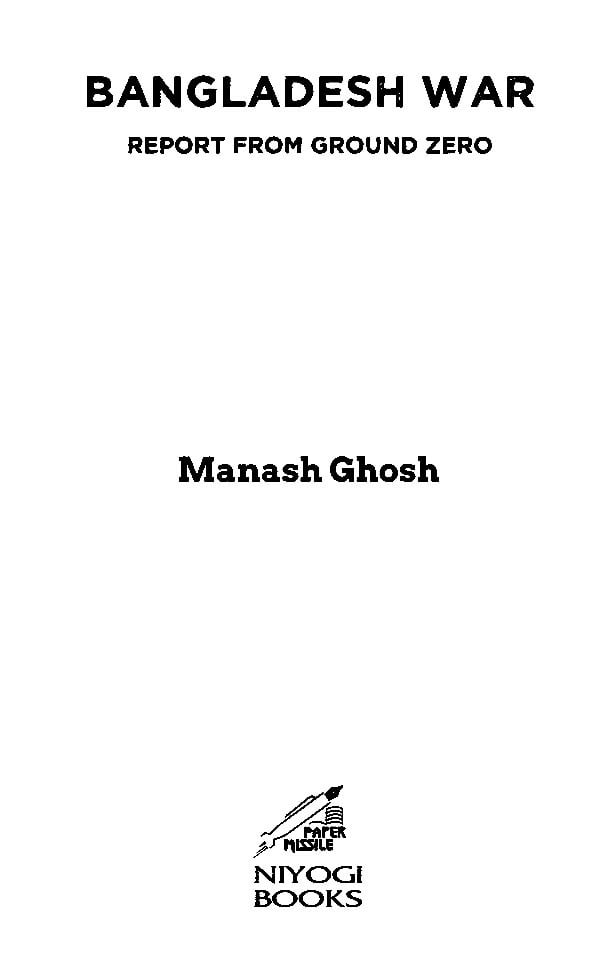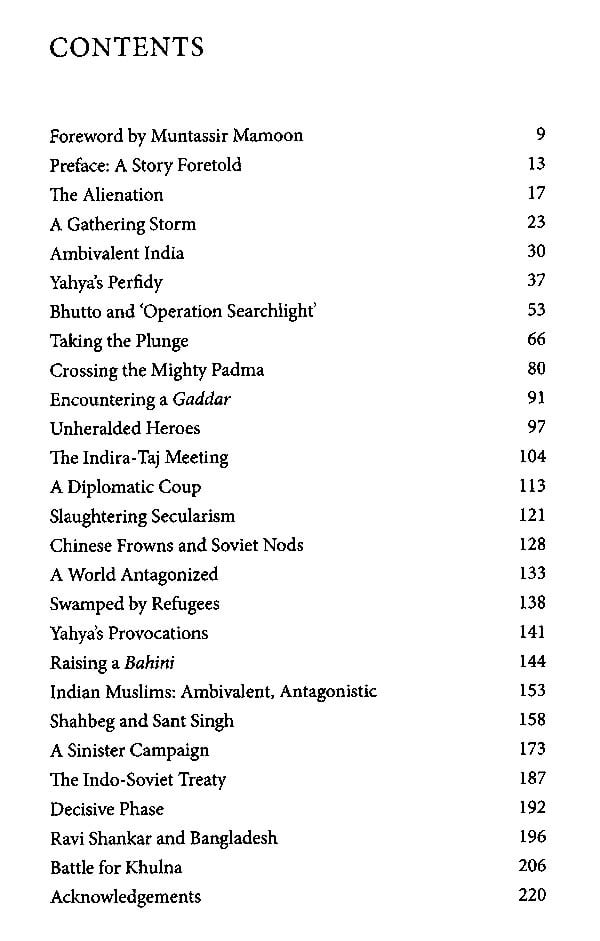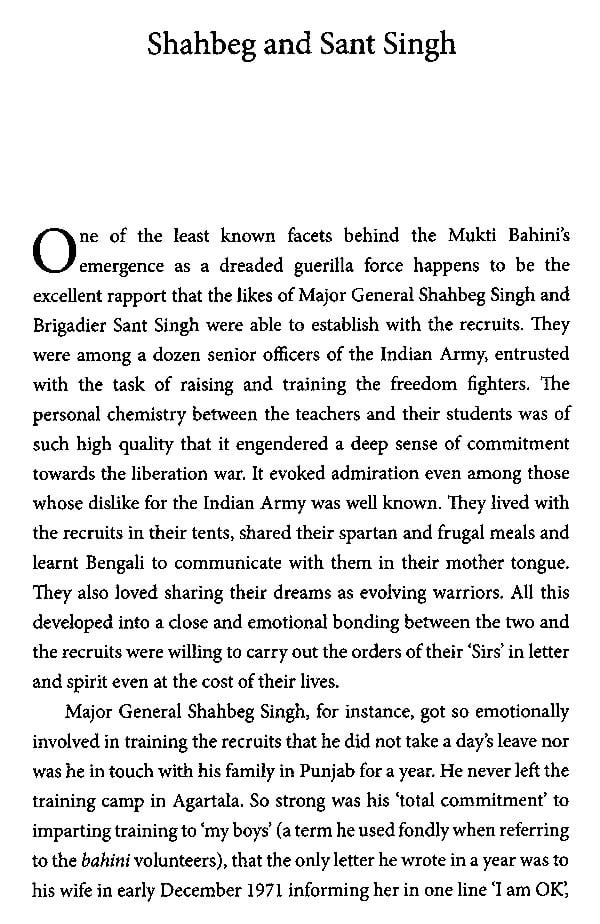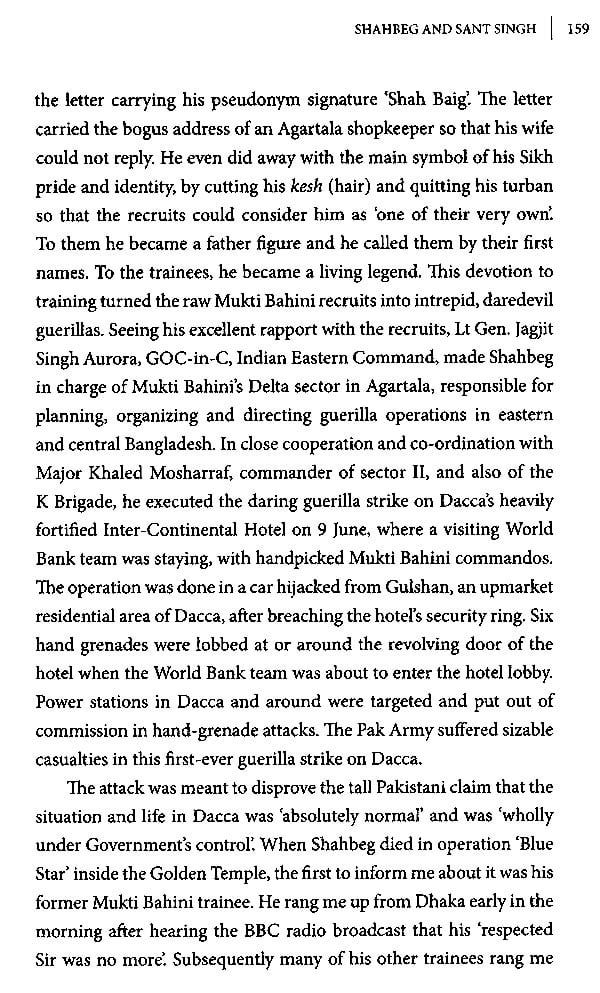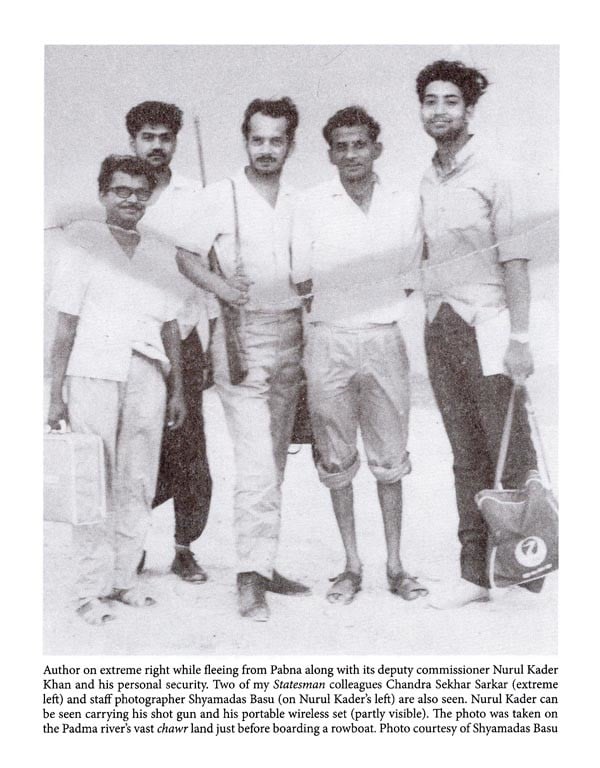
Bangladesh War- Report From Ground Zero
Book Specification
| Item Code: | AZE073 |
| Author: | Manash Ghosh |
| Publisher: | Niyogi Books |
| Language: | ENGLISH |
| Edition: | 2021 |
| ISBN: | 9789391125370 |
| Pages: | 218 (Throughout B/w Illustrations) |
| Cover: | HARDCOVER |
| Weight | 390 gm |
Book Description
The Bangladesh Liberation War of 1971, also known as the Muktijuddho, was a result of the total alienation of the Bengalis of East Pakistan from the non-Bengalis of the West, setting off a violent political upheaval in the eastern unit of the country, ultimately leading to the formation of the People's Republic of Bangladesh.
This riveting first-hand account of the liberation war has been written by a former journalist of The Statesman. In fact, the author, then a mere cub reporter, had predicted the coming of the war as early as in January 1971 by writing an article in the Sunday Statesman titled 'When Brother meets Brother. When the conflict started, he was one of the very few Indian journalists who covered the epochal event from the very beginning until the final surrender by the Pakistan military in Khulna on 17 December.
The highlight of this book is how Sheikh Mujibur Rahman, impelled by the ruling military junta's highly exploitative and discriminatory policies pursued towards the Bengali population, evolved the Bengali mindset for waging a Muktijuddho for their independence with Indian help. Having gone deep inside East Pakistan to cover the liberation war and being on good terms with sector commanders of the Mukti Bahini and senior Awami League leaders, the author provides many hitherto unknown facts which add a different dimension to this book.
Manash Ghosh graduated from St. Stephen's College, Delhi and joined The Statesman in 1966 as a trainee journalist. His big break came in 1971 when the Bangladesh Liberation War started. He covered it from various battlefields as an embedded journalist at considerable risk to his life. After the war, when Bangladesh became independent, he was posted in Dacca as the paper's bureau head for three years. He has served in various positions including as chief of Calcutta news bureau and as resident editor of the Delhi edition. In 2004 he became the founding editor of Dainik Statesman, a Bengali language daily newspaper run by The Statesman group, which he helmed for 11 years.
I am still not sure whether it was my reporter's intuition - I was just a cub reporter at the states of sheer providence that saw me attending the Second Asian Highway Car Rally on the morning of 15 November 1970 at the India-East Pakistan border at Petrapole-Benapole. This rally from Tehran to Dacca, was being organized by a UN body, the Economic Commission for Asia and the Far East (ECAFE), and was taking place four days after the catastrophic cyclone that had struck the southern deltaic region of East Pakistan.
That turned out to be the most rewarding day of my journalistic career.
The cyclone had claimed over 500,000 human lives and had caused incalculable destruction of property. More importantly, the car rally provided me with the most fascinating insight, invaluable to any reporter, into the tumultuous developments that had been set in motion in East Pakistan for the next one year. I had the proud privilege of covering them for The Statesman for the entire period.
My initiation into the coverage of the Liberation War and my subsequent three-year posting in Dacca in an independent Bangladesh was somewhat unconventional and dramatic. The 60 participants in their cars of various makes heading for Dacca that day paled into insignificance when I caught the chitchat between the Bengalis from the other side of the border, in what was considered to be no man's land. I did not know them but eavesdropping into their conversation was mesmerizing. For me, that was more intriguing than the harrowing tales of the rallyists, who had driven all the way down from Tehran to the Indian border town, Bongaon.
I got talking to the three Bengali strangers. Great talkers, as most Bengalis are, they chronicled for me the events on their own - from Field Marshal Ayub Khan's downfall, caused mostly by a mass upheaval in East Pakistan, to General Yahya Khan's rise to power, and Sheikh Mujib's six-point autonomy movement which had overwhelmed the Bengali mind in the country's eastern province in the preceding months.
The trio's cogently argued narrative was laced with such credible interpretation of events that, initially, I thought they were seasoned politicians. The ensuing tumult in the region proved how prescient they were. I asked them point blank whether they were from Sheikh Mujib's Awami League. Their immediate riposte was 'Every Bengali today, whether Muslim, Hindu or Buddhist, in East Pakistan, is a committed follower of Sheikh Mujib and his Awami League. The trio grabbed the opportunity to befriend me when I told them that I was a reporter from The Statesman, Calcutta.
They were cautious though. Prior to opening up, they had given me a bit of a shock when they somewhat apologetically asked me for my official identity card saying 'We want to be absolutely sure who you are. Unused to having my identity questioned, I reluctantly showed them my ID card and the change was instantaneous: 'Now we can talk to you freely, they said as they predicted the shape of things to come in their province. They would not disclose their identities though.
Manash Ghosh's steadfast and unwavering commitment to stand by the defenceless and persecuted Bengalis of former East Pakistan led to this book. It impelled him to report, disregarding grave danger to his personal life, the mass slaughter of Bengalis by the Pakistani military in its bid to deny them the fruits of an overwhelming electoral verdict. He was swayed by their uncompromising fight, led by their unquestioned leader Sheikh Mujibur Rahman, to attain political independence and economic freedom for themselves. Manash Ghosh was the first foreign journalist to enter erstwhile East Pakistan to report the mayhem that the Pakistan military had unleashed on unarmed Bengalis while executing 'Operation, Searchlight. He also happened to be the first foreign journalist to report on the valiant popular resistance that all sections of the Bengali society had put up against the ruthless Pakistani onslaught of which the world was then totally unaware. His reporting on the Jessore resistance on 30 March 1971 in The Statesman with telltale war photographs bear testimony to this fact. It was this reporting which brought international journalists like Peter Hazelhurst of The Times, London, and Martin Woollacott of The Guardian post haste to Calcutta to report on the freedom struggle being waged by the Bengalis. His reporting from Chuadanga and Pabna in the first week of April was also a pathbreaking journalistic exercise. No other foreign journalist had dared to go so deep inside the Pakistani territory which had already come to be known as Bangladesh. He was one of the very few Indian journalists who had covered the liberation war from start to finish and whose reports from the front were given due weightage by the Indian policy planners in Delhi and also by the Calcutta-based Tajuddin Ahmed-led government in exile which factored his news reports into their decision-making while strategizing the conduct of the muktijuddho.
Well before the war started, Manash Ghosh was the first among journalists who wrote an article in The Sunday Statesman predicting what was going to happen in East Pakistan. Even after Bangladesh came into being his respect for democratic aspirations of the Bengalis did not wane or flinch a bit. After Bangabandhu Sheikh Mujib's assassination whenever the military regime derailed or banished democracy from Bangladesh, he used his mighty pen to fight for the restoration of democracy in our country. This ensured that he was persona non grata in successive regimes of General Ziaur Rahman and General Ershad. He was blacklisted even by a democratically elected Prime Minister Begum Zia. She did not like his writings criticizing her government's policies to promote Islamic jihad and for highlighting her close ties with the Pakistani military regime led by General Parvez Musharraf. He was denied a visa for eight years as he was told bluntly by Bangladeshi diplomats that he was not welcome to their country for his anti-government writings. It was this uncompromising stance which earned him the respect and admiration of the Bengali leadership and masses. This transformed his image from that of a mere Indian journalist into 'our very own Manashda. In Bangladesh everyone from highly placed leaders, academics, to the man on the street address him by this honorific title.
